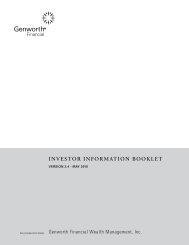Part 2A of Form ADV: Firm Brochure Item 1 Cover Page ROCHDALE ...
Part 2A of Form ADV: Firm Brochure Item 1 Cover Page ROCHDALE ...
Part 2A of Form ADV: Firm Brochure Item 1 Cover Page ROCHDALE ...
Create successful ePaper yourself
Turn your PDF publications into a flip-book with our unique Google optimized e-Paper software.
y the Adviser, client accounts may incur a loss.<br />
Leverage. Performance may be more volatile if a client’s account employs leverage.<br />
Hedging. There can be no assurances that a particular hedge is appropriate, or that certain risk is<br />
measured properly. Further, while the Adviser may enter into hedging transactions to seek to reduce risk,<br />
such transactions may result in poorer overall performance and increased (rather than reduced) risk for the<br />
Adviser’s investment portfolios than if the Adviser did not engage in any such hedging transactions.<br />
Frequent Trading. The Adviser’s primary strategy uses frequent trading which results in significantly<br />
higher commissions and charges to client accounts due to increased brokerage, which will <strong>of</strong>fset client<br />
pr<strong>of</strong>its.<br />
C. Risks Associated with Types <strong>of</strong> Securities that are Primarily Recommended<br />
Equity Securities. The value <strong>of</strong> equity securities fluctuates in response to issuer, political, market, and<br />
economic developments. Fluctuations can be dramatic over the short as well as long term, and different<br />
parts <strong>of</strong> the market and different types <strong>of</strong> equity securities can react differently to these developments. For<br />
example, large cap stocks can react differently from small cap stocks, and “growth” stocks can react<br />
differently from “value” stocks. Issuer, political, or economic developments can affect a single issuer,<br />
issuers within an industry or economic sector or geographic region, or the market as a whole. Changes in<br />
the financial condition <strong>of</strong> a single issuer can impact the market as a whole. Terrorism and related geopolitical<br />
risks have led, and may in the future lead, to increased short-term market volatility and may have<br />
adverse long-term effects on world economies and markets generally.<br />
Fixed-Income and Debt Securities. Investment in fixed-income and debt securities such as bonds, notes<br />
and asset-backed securities, subject a client’s portfolios to the risk that the value <strong>of</strong> these securities overall<br />
will decline because <strong>of</strong> rising interest rates. Similarly, portfolios that hold such securities are subject to<br />
the risk that the portfolio’s income will decline because <strong>of</strong> falling interest rates. Investments in these<br />
types <strong>of</strong> securities will also be subject to the credit risk created when a debt issuer fails to pay interest and<br />
principal in a timely manner, or that negative perceptions <strong>of</strong> the issuer’s ability to make such payments<br />
will cause the price <strong>of</strong> that debt to decline. Lastly, investments in debt securities will also subject the<br />
investments to the risk that the securities may fluctuate more in price, and are less liquid than higher-rated<br />
securities because issuers <strong>of</strong> such lower-rated debt securities are not as strong financially, and are more<br />
likely to encounter financial difficulties and be more vulnerable to adverse changes in the economy.<br />
Security Futures and Options. In connection with the use <strong>of</strong> futures contracts and options, there may be<br />
an imperfect correlation between the change in market value <strong>of</strong> a security and the prices <strong>of</strong> the futures<br />
contracts and options in the client’s account. In addition, the Adviser’s investments in security futures<br />
and options may encounter a lack <strong>of</strong> a liquid secondary market for a futures contract and the resulting<br />
inability to close a futures position prior to its maturity date.<br />
Offshore. As with all investment strategies, there are risks associated with its implementation. Applicable<br />
risks include, but are not limited to, market risk, unexpected volatility <strong>of</strong> stock prices, inflation risk, credit<br />
risk, and government policy risk. While these risks are monitored regularly by Rochdale Offshore<br />
Investment Management, they are still inherent in most investment strategies, including the one being<br />
implemented. Additionally, holding monies <strong>of</strong>fshore in custody adds a risk factor in dealing with and<br />
being subject to a foreign jurisdiction. These rules and regulations may provide more or less protection<br />
that what is afforded an investor who funds remain in the United States. Please consult with your<br />
investment or financial advisor to get a complete understanding <strong>of</strong> the risks that may affect your<br />
investment.<br />
Alternative Investments and Hedge Funds. Hedge funds and alternative investments are speculative and<br />
may entail substantial risks. Investing in small and medium-size companies and REITs may carry<br />
9








